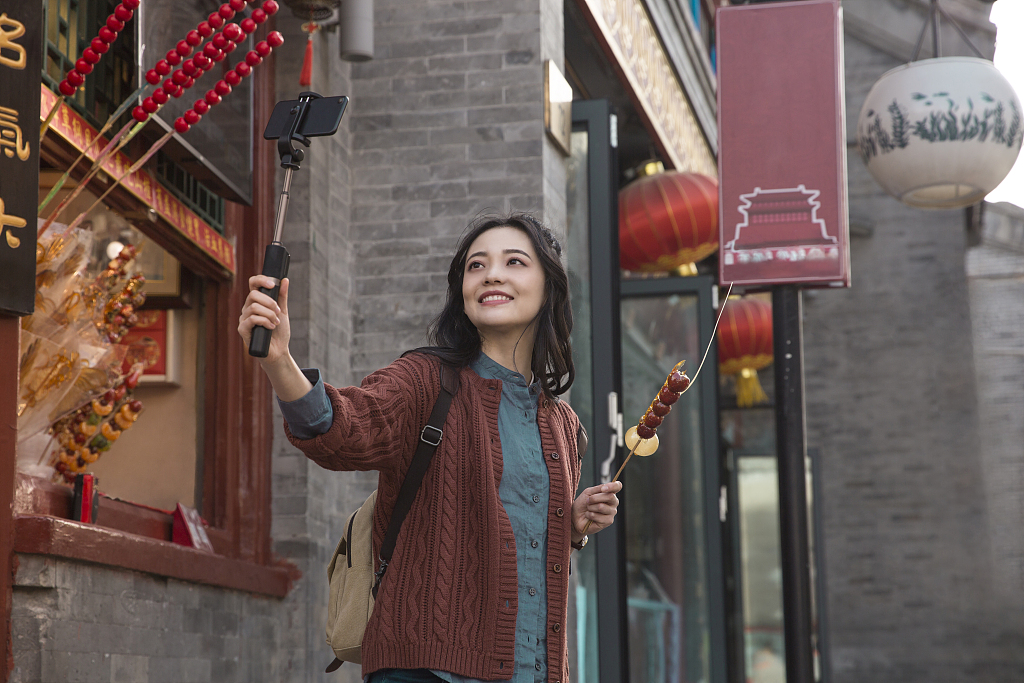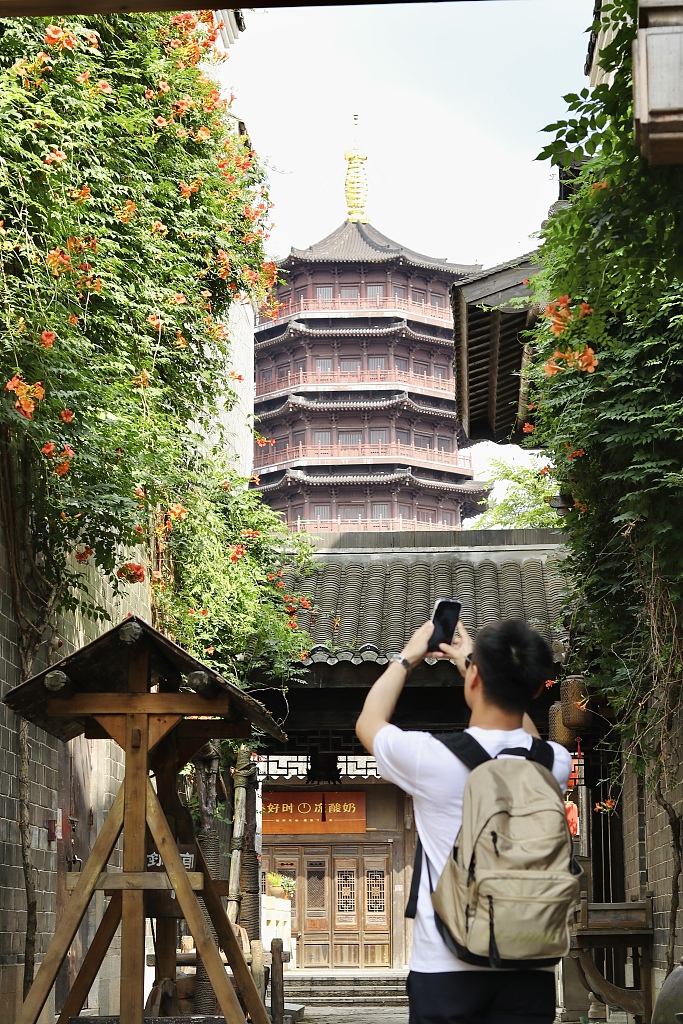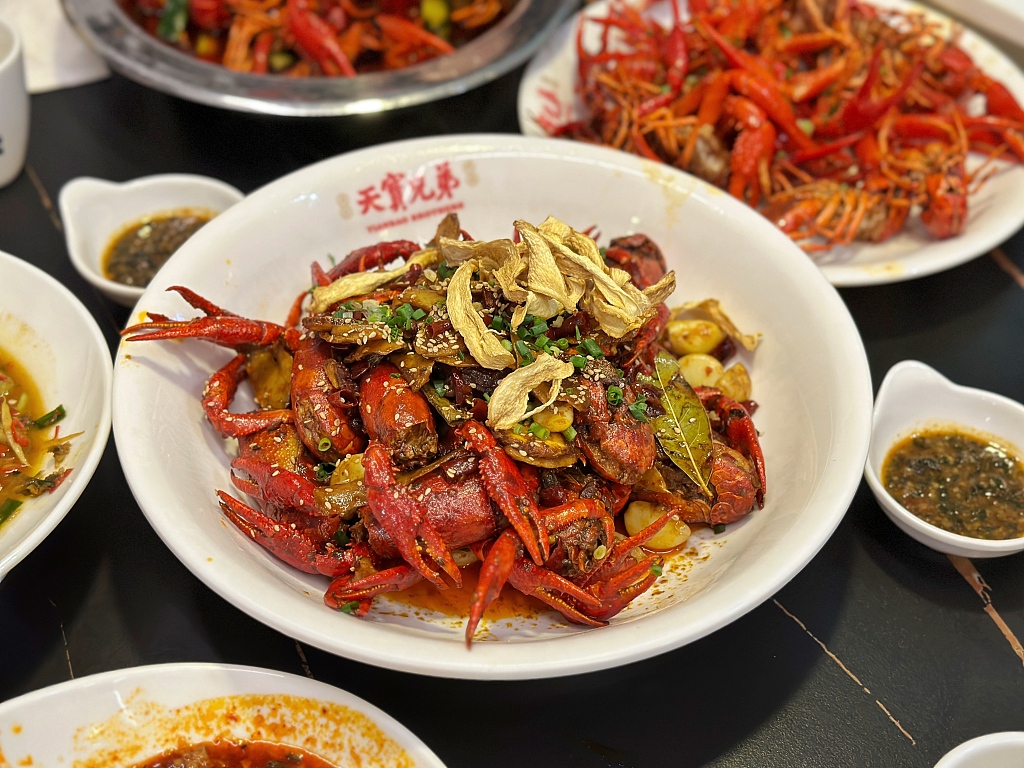
This file photo shows a young woman taking a selfie in Beijing's Qianmen area with a local tanghulu snack in hand. Made with sugared red hawthorn berries, the stick candy is a signature street snack of Beijing. /CFP
This file photo shows a young woman taking a selfie in Beijing's Qianmen area with a local tanghulu snack in hand. Made with sugared red hawthorn berries, the stick candy is a signature street snack of Beijing. /CFP
Gather together a couple of good friends and take a leisurely stroll through the streets – this is what many youngsters in China enjoy doing when they visit a new city.
To them, Citywalk means "roaming around the city" on foot. Participants can follow a distinctive urban route, soaking up the atmosphere, exploring old buildings, browsing boutique shops, sipping a cup of coffee, or indulging in authentic local snacks.
What is Citywalk?
It can be a special guided trip for a small group of people, or simply a leisurely stroll for one or two to explore new areas, sticking to the key point: avoiding famous scenic spots and big crowds to gain a more inclusive experience of the places you visit.
Hashtags and keywords for Citywalk are currently trending across multiple Chinese social media platforms, as more and more people look to share their experiences and thoughts online.

A young man takes a photo of a historic building in Changsha Tongguanyao Ancient Town, June 18, 2023. /CFP
A young man takes a photo of a historic building in Changsha Tongguanyao Ancient Town, June 18, 2023. /CFP
In China, the Citywalk trend is spreading from first-tier cities like Beijing and Shanghai to second and third-tier cities, encouraging more participants and event organizers to get involved. Some organizers invite folk culture researchers and enthusiasts to act as tour guides. Xiao Yiyi is a young entrepreneur based in Changsha exploring new possibilities in the tourism sector. Recently she launched six Citywalk routes in different cities on her social media account, with the aim of providing experiences for visitors to "walk in open-air museums."
Her Changsha route incorporates more offbeat sights like historical architecture from the 19th century, artsy old alleys, and even a stop-off to sample the local spicy crayfish specialty. Citywalk not only offers a way for young people to interact with a city but also provides them with a new social scene, where people who share the same interests and ideas can easily make friends. Xiao Yiyi said her group usually consists of a dozen or so people and her events last around half a day.

A photo taken on May 19, 2023, shows a spicy crayfish dish at Changsha's night market. /CFP
A photo taken on May 19, 2023, shows a spicy crayfish dish at Changsha's night market. /CFP
Some regions, such as Beijing and Shandong, have included Citywalk in their plans to promote cultural tourism and leisure tours. Shanghai has established Citywalk routes using public bus routes to help day-trippers reach more far-flung districts by public transport and continue on foot.
Even though Citywalk is a relatively niche and new phenomenon, industry insiders say that its potential is huge. Zhang Zhi, a tour guide from Beijing said tourists nowadays are paying more attention to personalized travel services. Many tour guides also try to expand their influence online, sharing their experiences in a bid to attract potential customers.
Citywalk is offering a positive change to urban travelers as they can better choose the experiences that align with their interests and needs. At the same time, Citywalk represents an opportunity for tour guides and travel service providers to offer a more tailored, professional service to meet with ever-changing market demands.